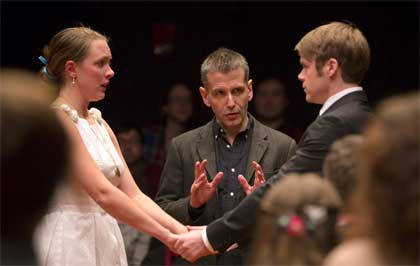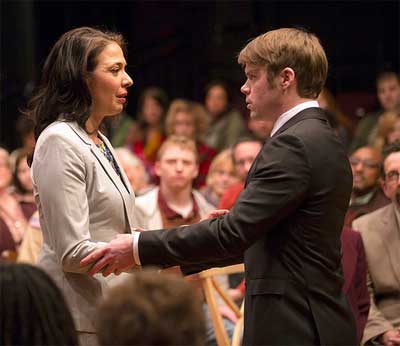Play (1937)
by Thornton Wilder
Directed by David Cromer
Huntington Theatre Company
Calderwood Pavilion, Boston Center for the Arts
Boston, MA
December 7, 2012 – January 26, 2013
With David Cromer (Stage Manager, through 12/30), Joel Colodner (Stage Manager, starting 12/31), Melinda Lopez (Mrs. Gibbs), Stacy Fischer (Mrs. Webb), Craig Mathers (Dr. Gibbs), Jay Ben Markson (Joe Crowell, Jr.), Alex Pollock (Howie Newsome), Derrick Trumbly (George Gibbs), Emily Skeggs (Rebecca Gibbs), Therese Plaehn (Emily Webb), Eliott Purcell (Wally Webb), Richard Arum (Professor Willard), Christopher Tarjan (Mr. Webb), Nael Nacer (Simon Stimson), Marianna Bassham (Mrs. Soames), Paul D. Farwell (Constable Warren), Ryan Wenke (Si Crowell), Dale Place (Joe Stoddard), Nicholas Carter (Sam Craig), Kathryn Lynch (Irma), Douglas Griffin (Farmer McCarty)
Citizens: Suzanne Bixby, James Bocock, Anne Colpitts, Kevin Fennessy, Michael Henry, James Knowlton, Jeff Marcus, Ellen Peterson, Bill Salem, Ann Marie Shea, Sophie Sinclair, Ralph Stokes, Lynn Wilcott

Photo: Paul Marotta
Courtesy Huntington Theatre Company
In Grover’s Corners, New Hampshire, people lead normal lives. They go to school, they work, they fall in love, they marry, they bear children, they die. And somewhere along the way, in the cracks between life and death, they begin to appreciate what it all means.
There is a lot of room for a production of this classic to be boring and played out – its subject is ordinariness and, if that is conveyed in an ordinary way, the results can be deadly.
That is not the case in this very fine production, expertly directed, with a talented ensemble cast, seemingly of thousands.
There are twenty main characters listed in the program, along with an additional thirteen “citizens.” That is enough to keep a good chunk of the Boston acting community off the streets for the next several weeks.

David Cromer as the Stage Manager
Derrick Trumbly as George Gibbs
in “Our Town”
Photo: T. Charles Erickson
Courtesy Huntington Theatre Company
David Cromer, the director, played the central role of the Stage Manager in this performance, and is slated at the end of the month to hand the role over to Joel Colodner, a fine actor who I have seen numerous times at the Actors’ Shakespeare Project and recently at the Lyric Stage in The Chosen.
Cromer was excellent, serving up a relaxed, almost seamless, patter that appeared to emerge right out of the audience chatter as each of the acts began. The house lights remain up for this performance and when he came out at the beginning of the show I thought he was just doing the prototypical theatre intro asking everyone to turn off cell phones. But, all of a sudden I realized he was starting the play. Brilliant.
The action in this production primarily takes place in an unraised rectangle around which the audience sits, but some actors take up positions in aisles separating the first audience rows from those behind them. This integrates the players with the audience, as do the unlowered lights.

Derrick Trumbly as George Gibbs
in “Our Town”
Photo: T. Charles Erickson
Courtesy Huntington Theatre Company
Many fine actors take part in this production.
Melinda Lopez, a local distinguished playwright and actress, did an excellent job as Mrs. Gibbs, offering a wife’s and mother’s seasoned cares and frustrations with feeling and nuance.
Derrick Trumbly played the passionate and earnest George Gibbs with sincere gusto.
Therese Plaehn as Emily Webb, the apple of his eye, was appropriately nervous and uncertain, doing a particularly amusing turn of uncertainty as she stood in church.
Christopher Tarjan provided a very funny Mr. Webb. At the point at which he was faced with carrying on a conversation with George Gibbs, he held the frustrated silence at great and uncomfortable length, and very humorously.
Nael Nacer, a great actor who I have seen do a wonderful variety of roles in various shows around town (Animal Crackers, 1001, The Kite Runner), played the possessed Simon Stimson with a dire authenticity that only had a few moments to show itself in the third act. Though a bit underused, he also played beautiful piano from the simulated church rafters.
Marianna Bassham, another Actors’ Shakespeare Project regular (especially wonderful as Viola in last season’s Twelfth Night), did a great job as Mrs. Soames, who could not help herself from speaking out in church at considerable tragicomic length.
The strength of this witty play is its combination of austerity and folksiness in producing an economical but vivid expression of a distinctively American form of existentialism. The folksiness might well border on sentimentality if the play were not so well targeted against it.
The creation of the construct of a Stage Manager narrating the entirety was a unique and risky choice by Wilder that eventually paid off. It resulted in a theatrical analogue to a holiday sermon delivered without a drop of sugar or spice. If one were to boil down It’s a Wonderful Life to its philosophical essence and add a straight shot of Robert Frostian bitters, one might arrive at the same place.
The directorial strategy and execution of this production is so right on that it all falls naturally into place, each of its ordinary acts rising up out of the audience embrace with its own charming gesture. The seemingly casual-offhand tone eases one into the presence of the conventional, and once there, the wryness and austerity of the writing, and continued deftness of the production, transport one to the darkly glowing spaces within.
– BADMan
Leave a Reply